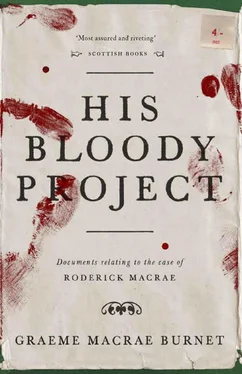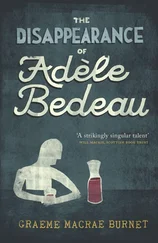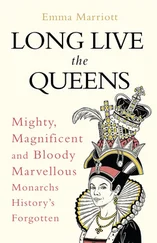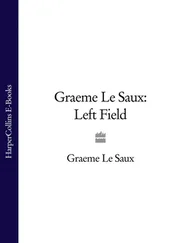Graeme Burnet - His Bloody Project
Здесь есть возможность читать онлайн «Graeme Burnet - His Bloody Project» весь текст электронной книги совершенно бесплатно (целиком полную версию без сокращений). В некоторых случаях можно слушать аудио, скачать через торрент в формате fb2 и присутствует краткое содержание. Год выпуска: 2015, Издательство: Contraband, Жанр: Современная проза, на английском языке. Описание произведения, (предисловие) а так же отзывы посетителей доступны на портале библиотеки ЛибКат.
- Название:His Bloody Project
- Автор:
- Издательство:Contraband
- Жанр:
- Год:2015
- ISBN:нет данных
- Рейтинг книги:5 / 5. Голосов: 1
-
Избранное:Добавить в избранное
- Отзывы:
-
Ваша оценка:
- 100
- 1
- 2
- 3
- 4
- 5
His Bloody Project: краткое содержание, описание и аннотация
Предлагаем к чтению аннотацию, описание, краткое содержание или предисловие (зависит от того, что написал сам автор книги «His Bloody Project»). Если вы не нашли необходимую информацию о книге — напишите в комментариях, мы постараемся отыскать её.
A brutal triple murder in a remote northwestern crofting community in 1869 leads to the arrest of a young man by the name of Roderick Macrae. There’s no question that Macrae is guilty, but the police and courts must uncover what drove him to murder the local village constable.
And who were the other two victims? Ultimately, Macrae’s fate hinges on one key question: is he insane?
His Bloody Project — читать онлайн бесплатно полную книгу (весь текст) целиком
Ниже представлен текст книги, разбитый по страницам. Система сохранения места последней прочитанной страницы, позволяет с удобством читать онлайн бесплатно книгу «His Bloody Project», без необходимости каждый раз заново искать на чём Вы остановились. Поставьте закладку, и сможете в любой момент перейти на страницу, на которой закончили чтение.
Интервал:
Закладка:
The court-room remained silent for some moments. Then the Lord Justice-Clerk asked, ‘Are your verdicts unanimous?’
‘They are by a majority,’ the foreman replied, ‘of thirteen to two.’
Mr Sinclair placed his head in his hands, then turned to look at his client. Roddy remained motionless in the dock. Nothing happened for a few seconds. There was no reaction from the gallery, as if it was only now the spectators grasped that what they had been watching was no mere pantomime.
The Lord Justice-Clerk thanked the jurors for their diligent attention throughout the proceedings. ‘You must,’ he said, ‘feel no compunction about the verdict you have delivered as it is in accordance with the evidence you have heard. All responsibility lies with the prisoner, whose acts have brought us to this place and the consequences of your judgement are a matter for the Law and the Law alone.’
The verdicts were then signed by the judges. Roddy was instructed to stand and the judge donned the black cap.
‘Roderick John Macrae, you have been found guilty by the verdict of the jury of the murders charged against you, a verdict which proceeds upon evidence which could leave no disinterested observer in any doubt. You have killed three people, one a small child, another an innocent girl in the flush of youth, and you have inflicted injuries on their persons of the most shocking nature. We have heard, as we should, a great deal of discussion of the motives for these wicked crimes, but having been pronounced guilty, these motives are of no consequence, and there is but a single sentence that can be pronounced. You are condemned to suffer the last penalty of the law. I hope that you will use the short time left to you to repent your actions and make use of the ministers of religion available to you, but I fear, from what I have heard in these proceedings, that you will not do so.’
He then formally pronounced that the prisoner would be executed at Inverness Castle between the hours of eight and ten o’clock on the morning of the 24th of September. He then removed the black cap and added, ‘May God have mercy on your soul.’
Epilogue
The trial of Roderick Macrae ended on Thursday the 9th of September. The following morning Mr Sinclair sought out John Murdoch and presented him with Roddy’s manuscript. There was at this time no formal mechanism for appeal in Scots Law and the advocate hoped to enlist Murdoch’s assistance in mounting a campaign for the commutation of Roddy’s sentence. His logic appears to have been that the publication of Roddy’s memoir would lead to a wave of popular support for the condemned man.****
**** Forty years later, albeit in very different circumstances, a petition signed by 20,000 people was instrumental in the overturning of Oscar Slater’s death sentence.
Mr Murdoch was sceptical, though not unsympathetic to the advocate’s plan, and agreed to read the manuscript and approach the editor of the Inverness Courier with a view to printing a series of extracts in the newspaper or a ‘Special Edition’. Mr Sinclair left the matter in his hands and spent the weekend drafting a petition to the Lord Advocate, Lord Moncrieff, the highest legal authority in the land.
In his letter, Mr Sinclair made no attempt to claim that his client’s conviction was unsafe, or that there was anything improper in the conduct of the trial. Instead, his appeal for clemency was made on openly compassionate grounds. After a perfunctory summary of the particulars of the case, he made his plea:
As both the evidence heard at trial and the prisoner’s account attest, Roderick Macrae was driven to the acts of which he has been found guilty by the purposeful and determined persecution of the individual who was to become his principal victim. Sufficient evidence was heard at trial of the eccentric behaviour and mental defects of the accused, for the jury to deliberate into a second day; and the verdict, when it came was by majority, this in itself evidence that it is within the bounds of rationality for a reasonable man to take the view that the accused was not of sound mind. And this in the face of the repeated and self-damaging pronouncements made by the prisoner himself; pronouncements, I might add, which do not speak of a rational mind. For what sane man would freely make statements which, if accepted at face value, would consign him to the gallows? That such reasonable doubts about the sanity of my client exist in the minds of the jurymen surely militates against the imposition of the severest penalty of the Law.
During his incarceration, my client applied himself diligently to the production of an account on the events leading up to the crimes (a copy of which I submit for your consideration). In so doing he has demonstrated abilities and an intellectual capacity far in excess of what might be expected of an individual of his education and background. Mr J. Bruce Thomson, Resident Surgeon to the General Prison in Perth, stated in evidence that in his many years’ experience of dealing with convicts and madmen, he has never encountered a single prisoner capable of producing any work of literary merit, a judgement which underscores the exceptional nature of Mr Macrae’s memoir. To put to death an individual with the sensibility and intelligence to produce an extended literary work, would, I strongly aver, be a cruel and uncivilised act.
In addition, the prisoner’s age — a mere seventeen years — and his otherwise unstained character, may also be offered in mitigation. The acts for which Mr Macrae has been found guilty were quite out of character and there is every reason to suppose that, given his exceptional gifts, after a period of incarceration he might live a productive and fruitful life.
If we measure our society by the compassion we extend to all its members, then it must be admitted that in extending such compassion to the most wretched amongst us, we demonstrate our fidelity to the most civilised Christian values. It is in this spirit that I petition your Lordship to extend clemency to the person of Roderick John Macrae.
May it therefore please the Lord Advocate to take this Memorial into his most favourable consideration, and thereafter to advise Her Most Gracious Majesty to exercise her royal prerogative to the effect of commuting the sentence passed upon the prisoner.
[Signed] Mr Andrew Sinclair esq.
Solicitor to the prisoner.
The petition was submitted on Monday the 13th of September and on the same day, the Inverness Courier printed John Murdoch’s article, ‘What we have learned from this case’. Murdoch began by reflecting on his experience in the court-room, describing Roddy as ‘a forlorn individual, whom to look at one would suppose had no connection to the proceedings around him. Whether this was due to a callous indifference or an alienation of the mind; or whether this attitude was affected or real, I am not qualified to say. But neither am I convinced that entrusting the task of resolving this question to fifteen honest, but equally unqualified, jurors is the most prudent means to serve justice in a case of this character.’ Murdoch went on to discuss Roddy’s memoir. His account was, he wrote, ‘by turns both shocking and affecting, and certainly does not appear to have been written with a view to winning the prisoner’s release. Nevertheless, the eloquence and intellect it displays stand in stark contrast to the bloody deeds it ultimately describes; and if nothing else, there seems a madness in this.’ Murdoch fell short of directly appealing for the commutation of Roddy’s sentence, instead expressing in a general way that the law as it stood was ‘inadequate to deal with proceedings of this nature. Our highest legal minds should, with alacrity, reconsider our procedures in relation to cases which hinge on the sanity or otherwise of the accused, and until such a review can be conducted,’ he wrote, ‘it would be unseemly to send a man to the gallows.’
Читать дальшеИнтервал:
Закладка:
Похожие книги на «His Bloody Project»
Представляем Вашему вниманию похожие книги на «His Bloody Project» списком для выбора. Мы отобрали схожую по названию и смыслу литературу в надежде предоставить читателям больше вариантов отыскать новые, интересные, ещё непрочитанные произведения.
Обсуждение, отзывы о книге «His Bloody Project» и просто собственные мнения читателей. Оставьте ваши комментарии, напишите, что Вы думаете о произведении, его смысле или главных героях. Укажите что конкретно понравилось, а что нет, и почему Вы так считаете.












